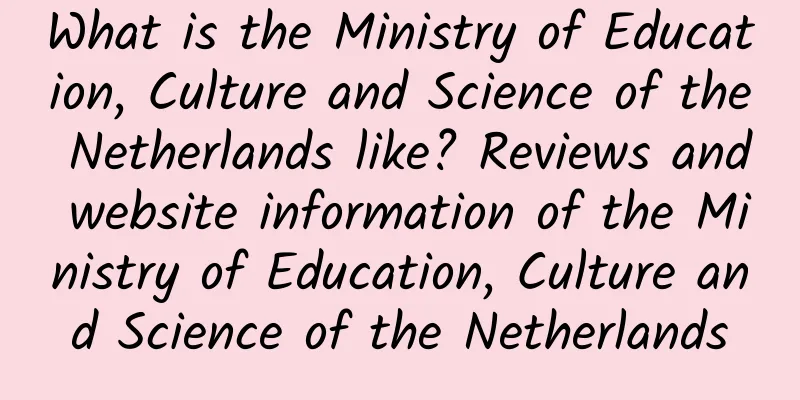What is the Ministry of Education, Culture and Science of the Netherlands like? Reviews and website information of the Ministry of Education, Culture and Science of the Netherlands

|
What is the website of the Ministry of Education, Culture and Science of the Netherlands? This website is the official website of the Ministry of Education, Culture and Science of the Netherlands. It mainly provides information about department settings, education system, cultural development guidelines, scientific development policies, news, relevant laws, etc. The website is available in Dutch and English. The Netherlands is a country that attaches great importance to education, and its education system is world-renowned. The Netherlands implements 12 years of compulsory education, and the education system is divided into three levels: primary education, secondary education and higher education. Website: www.rijksoverheid.nl The Ministry of Education, Culture and Science is an important department of the Dutch government, responsible for formulating and implementing national policies in the fields of education, culture and science. The official website of the department (www.rijksoverheid.nl) is the main channel for the public to obtain relevant information, providing information on department settings, education system, cultural development guidelines, scientific development policies, news, relevant laws, etc. The website supports both Dutch and English languages. Overview of the Dutch education systemThe Netherlands is a country that attaches great importance to education, and its education system is world-renowned. The Netherlands implements 12 years of compulsory education, and the education system is divided into three levels: primary education, secondary education and higher education. Primary EducationPrimary education in the Netherlands is for children aged 4 to 12 and usually lasts for 8 years. The goal of primary education is to help children develop cognitively, emotionally, socially and physically. The curriculum includes language, mathematics, science, art and sports. Secondary EducationSecondary education is for students aged 12 to 18 and is divided into several different types, including general secondary education (VMBO), higher secondary education (HAVO) and university preparatory education (VWO). Each type of secondary education has its own specific curriculum and teaching goals, designed to prepare students for entry into higher education or the job market. Higher EducationHigher education in the Netherlands consists of research universities (Universiteiten) and universities of applied sciences (Hogescholen). Research universities mainly offer academic courses, while universities of applied sciences focus more on practice and application. Higher education institutions in the Netherlands are known for their high-quality teaching and research, attracting students from all over the world. Cultural Development PolicyThe Ministry of Education, Culture and Science's responsibilities in the cultural field include protecting and promoting the Netherlands' cultural heritage, supporting innovation in art and culture, and promoting international cultural exchange. The department ensures that Dutch culture is recognized and spread around the world by formulating and implementing relevant policies. Cultural Heritage ProtectionThe Netherlands has a rich cultural heritage, including historical buildings, museums, libraries and archives. The Ministry of Education, Culture and Science of the Netherlands ensures that this cultural heritage is properly maintained and passed on through financial support and legal protection. Art and cultural innovationThe Dutch government encourages innovation in art and culture and promotes diversity and creativity in the cultural field by funding art projects and supporting artists and cultural institutions. International Cultural ExchangeThe Netherlands actively participates in international cultural exchanges and promotes mutual understanding and respect of cultures through cooperation with other countries and regions. The Ministry of Education, Culture and Science of the Netherlands supports various international cultural exchange projects, including art exhibitions, cultural exchange activities and international cooperative research. Scientific Development PolicyThe Ministry of Education, Culture and Science of the Netherlands has responsibilities in the field of science, including promoting scientific research, supporting scientific and technological innovation, and promoting the popularization and application of scientific knowledge. The Ministry ensures that the Netherlands maintains its leading position in science by formulating and implementing relevant policies. Scientific researchThe Netherlands has world-class research institutions and universities. The Ministry of Education, Culture and Science of the Netherlands promotes scientific research through financial support and policy guidance. The Netherlands has made remarkable achievements in many scientific fields, such as life sciences, environmental sciences, engineering technology and social sciences. Technological innovationThe Dutch government encourages scientific and technological innovation and promotes innovation and development in the field of science and technology by supporting start-ups, providing R&D funds and promoting industry-university-research cooperation. The Netherlands has many innovative companies and research institutions in the fields of information technology, biotechnology, new energy, etc. Popularization of scientific knowledgeThe Ministry of Education, Culture and Science of the Netherlands is committed to popularizing scientific knowledge and improving the public's scientific literacy by carrying out popular science activities, supporting scientific education, and promoting the dissemination of scientific knowledge. The Dutch government supports various popular science projects, including science exhibitions, popular science lectures and science education courses. News and LawThe official website of the Ministry of Education, Culture and Science of the Netherlands provides the latest news and relevant information to help the public understand the latest developments and policy changes in the department. In addition, the website also provides relevant laws and regulations to ensure that the public can understand and comply with relevant laws. News ReleasesThe Ministry of Education, Culture and Science of the Netherlands regularly publishes news covering the latest developments, policy changes and important events in the fields of education, culture and science. The public can obtain the latest news information and learn about the work progress of the department through the website. Laws and regulationsThe official website of the Ministry of Education, Culture and Science of the Netherlands provides relevant laws and regulations, including education law, cultural law and science law. The public can consult relevant laws through the website to understand their rights and obligations. Department SettingsThe Ministry of Education, Culture and Science of the Netherlands consists of several departments, each responsible for specific matters in the fields of education, culture and science. Each department has a clear division of labor and cooperates with each other to ensure the smooth progress of the work of the department. Education DepartmentThe education department is responsible for formulating and implementing education policies, including those for primary, secondary and higher education. The department is also responsible for the allocation and management of education funds to ensure the rational allocation of education resources. Cultural sectorThe cultural department is responsible for formulating and implementing cultural policies, including cultural heritage protection, artistic and cultural innovation, and international cultural exchanges. The department is also responsible for the allocation and management of cultural funds to ensure the rational allocation of cultural resources. Science DepartmentThe science department is responsible for formulating and implementing scientific policies, including scientific research, technological innovation, and popularization of scientific knowledge. The department is also responsible for the allocation and management of scientific funds to ensure the rational allocation of scientific resources. SummarizeThe Ministry of Education, Culture and Science is an important department of the Dutch government, responsible for formulating and implementing national policies in the fields of education, culture and science. The official website of the department is the main channel for the public to obtain relevant information, providing information on department settings, education system, cultural development guidelines, scientific development policies, news, relevant laws, etc. The Netherlands is a country that attaches great importance to education, and its education system is world-renowned. The Netherlands implements 12 years of compulsory education, and the education system is divided into three levels: primary education, secondary education and higher education. The Ministry of Education, Culture and Science ensures that the Netherlands maintains its leading position in education, culture and science by formulating and implementing relevant policies. |
<<: Siberia Airlines_S7 Airlines review and website information
>>: How is Boston Real Estate? Boston Real Estate Reviews and Website Information
Recommend
How to make shrimp porridge
The method of making shrimp porridge is actually ...
What are the nutritional value and benefits of jackfruit
Jackfruit is a fruit that looks like durian, but ...
How to make hawthorn wolfberry tea
Do you suffer from high blood lipids, high blood ...
What is the International Olympic Committee like? International Olympic Committee reviews and website information
What is the website of the International Olympic C...
Is coconut nutritious? What nutrients does coconut have?
Is coconut nutritious? I believe many friends wil...
The calories in cornmeal and the effects of cornmeal
Cornmeal contains a variety of nutrients, such as...
What are the nutritional values of grapes?
With the coming of summer, sweet grapes are on th...
Pumpkin and Barley Porridge
Pumpkin and Barley 654 porridge is a porridge wit...
The efficacy and function of black coconut shell
Do you know about black coconut shell? It is a sp...
How is the Queen of the Netherlands? Reviews and website information of the Queen of the Netherlands
What is the website of the Dutch Queen's Store...
Eating pears can supplement vitamins
Pears are very juicy and people love to eat them,...
How about the castle pictures? Castle picture reviews and website information
What is Castle Pictures? Castle Pictures is a webs...
Ingredients and steps for lotus seed, lily and red bean porridge
I recommend eating lotus seed, lily and red bean ...
The efficacy and effects of vitamin F and the harm of excess vitamin F
As we all know, vitamins are important for mainta...
What are the benefits and effects of lotus on humans
The lotus has beautiful flowers, elegant colors, ...









